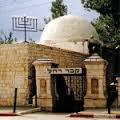This weekend’s parsha begins with the fear of death. Jacob is about to meet his brother Esau after decades of separation. He can expect trouble; he left home, in part, because of Esau’s murderous rage.
There is a near fight-to the death, too. The night before the brothers meet, Jacob battles with a mysterious stranger – angel of God? God, Godself? A man he does not know? The spirit of his brother? The battle goes on through the night – ceasing only at daybreak. Jacob is freed and renamed.
But the cascading encounter with death continues as we read on. Death is no longer threatened, but real. We hear that Rebecca’s nurse has died. Just a few verses later, Rachel dies while giving birth to her second son, Benjamin. Finally, near the close of the parsha, Isaac dies.
Torah records these deaths in different tonalities. Deborah’s death is almost an aside; the fact that she is mentioned is important – the mystery behind why she was important enough to merit mention goes unsolved.
Rachel’s death is a scene of anguish: Her own midwife rejoices and tells her: “Do not fear you will have another son!” But as she breathes her last, she names her son according to his birth: Ben-oni, son of my sorrow. Jacob renames the boy immediately: He called him Benjamin, evoking a wholly different idea. Son, “ben” of days “ Son, of long life “yamin (m).”
Finally, we read of Isaac’s death, a death which brings together his once-warring sons. They bury him together. He is “gathered to his kin.”
So often, it is said, Judaism has little to nothing to say about the process of death or what might come after it. Yet, there is much in our tradition that offers thoughtful comfort. We do not subscribe to a vision of hell awaiting the wicked. We do not espouse eternal torment and everlasting punishment. But what do our traditions imagine?
Inheritance of spirit and soul: We would not say, “may her (his) memory be a blessing” otherwise. But we have traditions in which those who have died communicate with those still living. And there are Jewish ideas around a kind of reincarnation.
Our tradition mostly speaks to what is – what we face, what we must do on this earth, in our time. Yet Judaism does have something to say about birthing death with hope.
And that will be the subject of my sermon tonight. Please join us at Piedmont Unitarian Universalist Church, 9704 Mallard Creek Road at 7 p.m. Oneg follows.





